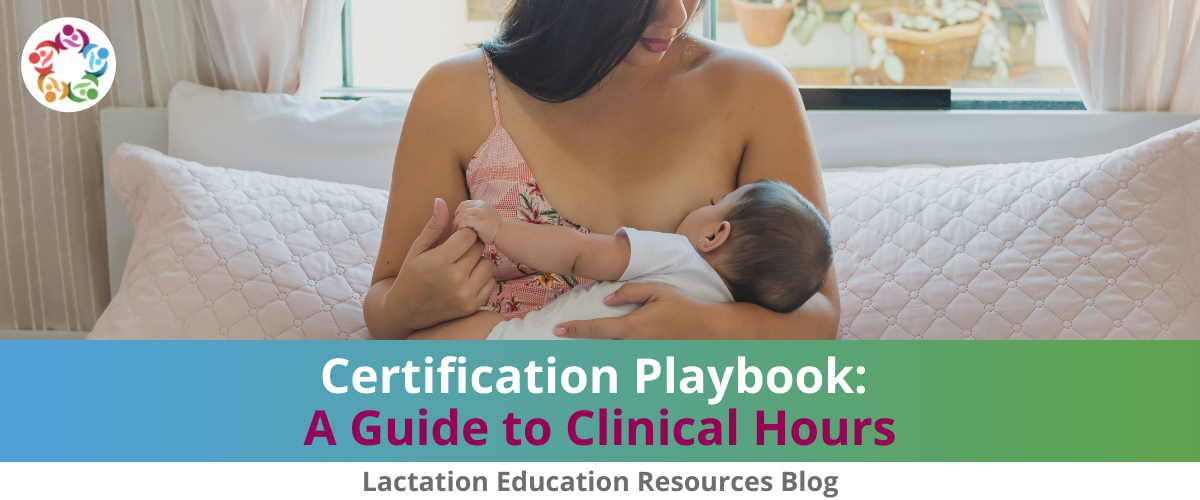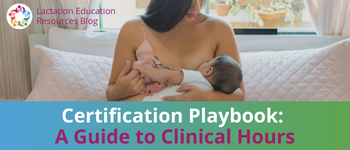Certification Playbook: A Guide to Clinical Hours


Welcome back to LER’s Certification Playbook! This series is designed to assist you on your journey to becoming an IBCLC.
Your guide is Angela Love-Zaranka, BA, IBCLC, RLC, Program Director at Lactation Education Resources (LER). Love-Zaranka served on the International Board of Lactation Consultant Examiners® (IBLCE®) Board from 2006 to 2012 and sat on IBLCE committees until 2015.
In this post, we asked her to answer questions about one of certification’s biggest steps: Getting your clinical hours.
Let’s jump in.
Q: How many clinical hours do I need to apply for the exam?
A: It depends on which Pathway you’re pursuing.
Pathway One requires 1,000 hours of lactation-specific clinical practice in an approved setting within five years prior to the exam application.
Some candidates on Pathway One are employed by hospitals, birth centers, clinics, primary care offices, and more, and get their hours through their employment.
Others on Pathway One obtain their hours by serving as volunteer lactation support counselors with IBLCE-recognized volunteer organizations.
Hours have historically been awarded on a flat-rate basis when earned this way (applicants received a certain number of hours for each year they served with the volunteer organization). However, beginning in 2022, hours must be documented and calculated. (For more information, including a list of IBLCE-recognized volunteer organizations, visit the IBLCE site here.)
Pathway Two (attending an academic program) requires 300 hours of lactation-specific clinical practice within five years before the exam application, directly supervised by a currently certified IBCLC.
Pathway Three (a formal mentorship route) requires 500 hours of directly supervised clinical practice within five years prior to the exam application, under a currently supervised (and pre-approved) IBCLC mentor.
Q: Why so many hours?
A: Seeing more lactating parents and more babies begins to train your ability to evaluate and assess.
“The more people you help, the better you are able to discern what’s normal and what’s abnormal,” Love-Zaranka explains. “The better able you are to discern what’s typical and what’s atypical.”
It also helps you begin to learn when you can help and when you need to refer.
“For me, during my clinical hours is where I learned to discern, ‘Okay, I can help this person,’ versus ‘I need additional support here. I need an IBCLC or a provider or somebody else,’” Love-Zaranka says.
Q: When should I start my clinical hours?
A: That depends on how much you already know about lactation.
You need some didactic learning under your belt before you start helping families—it provides a foundation for your work, and it may expand your options for placement.
So if you’re just getting going and need to pick an initial goal, Love-Zaranka suggests starting with breastfeeding-specific education, before focusing on clinical hours.
This might look like starting a 90-hour course and completing some of it, taking a 45-hour course, or finding online courses to tackle some of the most basic topics on the IBLCE’s Detailed Content Outline (like latch, positioning, and anatomy and physiology).
“And then, as you’re continuing to work on your breastfeeding-specific education, start looking around for where you can serve,” she says.
Q: Where can I get my hours?
A: That depends in large part on which Pathway you choose.
Several settings, from peer-to-peer volunteer organizations to clinics and hospitals, are acceptable.
“If you have human milk fed, peer counseling might be a good option,” Love-Zaranka says.
Lactation Education Resources offers the LER HOURS program to help you earn clinical hours via this path. With HOURS, you earn hours while you support families in your community. LER endorses your hours and you can be sure they will "count" toward exam eligibility.
Other IBLCE-endorsed peer organizations may be operating in your community. Check this list.
In addition, obtaining an internship offers one of the best ways to get a rich clinical experience. LER has a supervised internship program which can help with finding a site and much more. Learn about it here.
Q: I work with families already. Does my job count?
A: If you work directly with lactation, it’s likely.
If you work in a field where you have contact with lactating families, time spent working directly with lactation will count. Check out our blog for targeted information Lactation Education Resources - Lactation Education Resources Blog - Can I Count It? Accruing Clinical Hours for Healthcare Providers (lactationtraining.com).
Q: Can clinical hours be earned virtually?
A: Yes–at least through September 30, 2025.
When the Covid-19 pandemic made in-person interaction harder, IBLCE issued temporary guidance allowing exam candidates to earn clinical hours by working virtually. This guidance has been extended repeatedly, and the most recent revision keeps the new rules in effect through September 30, 2025, when IBLCE will undoubtedly consider the issue again.
For many, this has made getting clinical hours much easier. It means geography doesn’t need to be a limiting factor–you don’t have to find a place to get hours in your own community.
If you are a lactation counselor with an IBLCE-approved volunteer support group, you can earn hours for helping parents virtually. You can also work with more than one IBCLC as a mentor, gaining a wider variety of experiences.
If you are seeking to work with a mentor virtually, be ready to learn the technology they use. Most IBCLCs use the paid version of Google Meet or Zoom, or a lactation specific platform.
Q: How can I find a mentor?
A: Whether you are required by your Pathway to have supervision for your hours or not, having an experienced IBCLC as a mentor is one of the best things you can do.
Finding a mentor is such an important topic, we have a separate blog on it. You can read it here.
Q: How do I document my clinical hours?
A: Take careful notes.
“If you spend one hour with a client, you need to document that. If you spend 3 hours with a client, you need to document that,” Love-Zaranka says. “Briefly note what the issue was and what you did.”
“It’s easier to document when you’re doing it than to try to do it backwards,” she continues. “I have seen it too many times where someone is questioning whether they got their hours. If you have it documented, it covers you.”
Documentation doesn’t have to be fancy. Love-Zaranka says simply using a paper calendar and logging hours under each day is enough.
“Just document your hours—every last one of them. Yes, it’s a pain. Yes, it’s annoying. But document those hours, and if you’re keeping an electronic version, back it up!”
Stay tuned for the next installments of the Certification Playbook. We’ll cover the Health Sciences requirement next.
See the entire Certification Playbook series
By accepting you will be accessing a service provided by a third-party external to https://www.lactationtraining.com/
